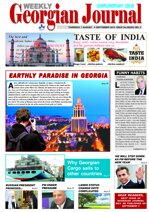Georgia’s Tourism Authority Says No to Ads on CNN and BBC - The FINANCIAL
30 July, 2013
 The FINANCIAL published an article about Georgia’s ads on international TV channels.
The FINANCIAL published an article about Georgia’s ads on international TV channels.‘The new Georgian Government is saying no to the country’s promotion via CNN, BBC and other leading international TV channels. “The previous TV campaign was quite simply a waste of money,” Giorgi Sigua, new Head of the Georgian National Tourism Administration (GNTA), told The FINANCIAL. Banners, LED screens and billboards, and online advertisements are the new advertising means of choice of the current administration.
“The money needs to be spent on promoting Georgia outside of Georgia, because once you get here it sells itself. People have not heard about the changes that have happened here over the last couple of years. As a tourist I would like to know more about Georgia,” Tom Flanagan, Area Vice President of the Rezidor Hotel Group, recently stated in an interview with The FINANCIAL.
“Awareness is relative. Georgia’s awareness in its neighbouring countries is high; in Eastern Europe it is average, and in the USA, Australia and Africa - very low,” Sigua stated.
Another complaint regarding a lack of information about Georgia outside of the country was logged by representatives of Kazakh travel companies. “Kazakh travellers have big interest in Georgia but a lack of available information is hampering bilateral relations,” The FINANCIAL was told at a meeting with travel agencies in Astana.
“When planning a promotional campaign you should research the gross rating point, which means defining your target audience. You can broadcast an ad for millions of people but none of them might necessarily be your target. CNN’s audience is North America. It is not our target market,” said Sigua.
“According to my information USD 24 million was spent on advertisements on CNN,” Sigua said.
Nata Kvachantiradze, Chairwoman of the Georgian Tourism Association (GTA), said that any marketing move is good for the development of tourism in Georgia.
“The country’s advertising campaign will continue in the future. A new marketing strategy is under development at the moment which will increase the country’s awareness in the future. The Government as well as private sector is involved in these processes,” Kvachantiradze added.
Sigua said that TV commercials are too expensive so they are currently focused on billboards and online advertisements. “We are going to advertise Georgia in Kiev , Donetsk and Kharkov. The budget of this campaign will be USD 200,000. Under these terms we will have 66 billboards and LED screens. Ukraine is a market with 45 million people. The number of Ukrainian visitors has already increased by 77%; by the end of 2013 we expect the level of growth to be 100%. We expect to host over 30,000 Ukrainian visitors next year. That means USD 30 million of income out of which USD 8-9 million will go to the budget.”
Ako Akhalaia, Senior Consultant at GEPRA, measured Georgia’s promoting campaign in several directions. “TV ads were normal, however, for the effectiveness of the campaign that is not enough. The point is what we wanted to get from this campaign. Enhancing the country’s awareness? Creating a proper image of the country or attracting more tourists? Although BBC and CNN have great awareness and reliability the results of the campaign showed that it achieved only the first two tasks. It missed the main point. It definitely raised the country’s awareness, formed a positive image, but did not provide enviable sales figures. It turns out that attracting one tourist is expensive for us. In my view, the advertiser was not sufficiently informed or did not adequately foresee the audience’s behaviour.”
“Official statistics clearly show that Georgia has been most attractive to our neighbour countries. Continuing with the old policy made no sense. It did not yield sufficient benefits for the country. Stopping promotion of the country will result in a reduction of tourists. However, we should remember that doing something does not always mean you are doing the right thing. If someone decided never to implement an advertising campaign for a target audience then that would be very bad,” said Akhalaia.
About the point - whether Georgia should continue its promotional campaign on leading TV companies - that is a marketing decision in Akhalaia’s view. “Although in Georgia marketing is mostly associated with creative processes, marketing encompasses the financial part. It does not matter whether it is the world’s leading media source or any other country’s, we as marketers are investing finances to receive more tourists and accordingly more money. Experience has shown that investing in an advertising campaign on CNN or BBC does not serve this purpose. It enhances the country’s awareness but does not attract as many tourists as we would desire,” said Akhalaia.
“Promotion of the country should continue but with new communication channels, online advertisements, media tours, by attracting travel agencies, banners and others. We should be aware of the markets and consumer behaviour of our target markets. The objective of investment is simple - to attract more tourists, where the price of the attraction is less than its profit,” Akhalaia said.
Georgia expects to host 5,500,000 international travellers this year, out of which only 57% will be tourists.
The annual budget for the year 2013 is USD 6.5 million. The amount that will be spent on our marketing campaign is 3.5 million, and the amount that will be spent on our campaign outside the country is 1 million.
“Kuwait, Qatar and Oman are markets that we will target. We want to run massive campaigns in Russia and Kazakhstan too,” said Sigua.
“From the beginning of August we will start our promotional campaign in the Baltic States and Israel,” Sigua told The FINANCIAL.
By Madona Gasanova
Related stories:
10 things you might not know about Georgia – BBC
Georgia - in BBC's World's Most Dangerous Roads documentary





















































